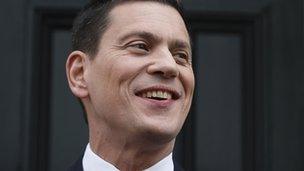Farewell, David Miliband
- Published
So. Farewell. Then. David Miliband. The former great white hope of the Blairites and ex-foreign secretary is leaving Parliament to run a major international charity.

Mr Miliband is taking up a job in the United States
People tend to get a bit snarky about politicians upping sticks between elections, partly because by-elections are not cheap, and the voters don't much like being bothered with avoidable trips to the polling station. But there's something else to be factored in; if you don't want to be in Parliament, you shouldn't be there.
At the Westminster level, politics has to be a vocation. You have to want it. You have to care. There's no point in simply shuffling through the lobbies out of habit. So if the vocation goes (and they can evaporate in the face of changing circumstance, family crisis, or sheer ennui) so should the politician. To paraphrase Bruce Springsteen, nobody knows where vocation goes; but when it goes, it's gone.
So let the job go to someone with real zest - because that's what the constituents and the country deserve.
In the brief twitterstorm (twitter-shower?) after the Mirror's scoop on Mr Miliband's departure emerged, I compared him to another lost leader, Michael Portillo. Neither seemed quite keen enough on leading their party - they would have accepted coronation, but wouldn't mud-wrestle for the crown. And after failing to win, they haunted the backbenches, making occasional spectral appearances, before finding another role to rekindle their enthusiasm. Lingering a while to see if the mojo returns, after such a rebuff, is fair enough. Feeling you have to stay to avoid your party losing a by-election is understandable, up to a point, but bed-blocking forever wastes space and short-changes democracy.
So Mr Miliband, and before him Louise Mensch, took the right decision for themselves and for politics.
It's not yet clear exactly when Mr Miliband will depart - although the smart money assumes he will time his leaving to allow a by-election on local election day. But I can't help wondering if his departure may tip other parliamentarians whose enthusiasm has waned into a career re-think.
To be sure, the 200-strong Commons intake of 2010 has been a breath of fresh air - most are energetic, smart and ambitious. But one or two are rather disappointed and disillusioned with parliamentary life.
And many of the individuals concerned could carve themselves a rewarding career outside Westminster. Then there are the MPs of a slightly older vintage, the 2001 and 2005 intakes, who've seen the newcomers leapfrog them into office. They might decide that perpetual backbencherdom is not an alluring prospect.
With the 2015 election approaching, so is the moment when MPs who've had enough will have to tell their local parties and set the process in train to find their successor.
In any even vaguely marginal seat, the parties will want their candidates in place and campaigning a year before the actual vote, so the time for that quiet drink with the local party chair is approaching fast. The Commons saw a considerable turnover in 2010, and it's likely there will be plenty more new faces in 2015, even if the party balance doesn't change much.
And maybe regular infusions of new blood will be no bad thing.